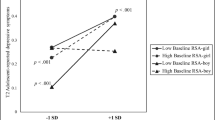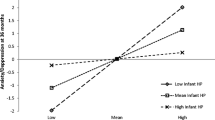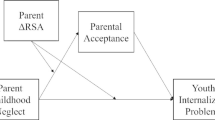Abstract
This study explored how patterns of physiological stress reactivity underpin individual differences in sensitivity to early rearing experiences and childhood risk for psychopathology. To examine individual differences in parasympathetic functioning, past research has largely relied on static measures of stress reactivity (i.e., residual and change scores) in infancy which may not adequately capture the dynamic nature of regulation across contexts. Using data from a prospective longitudinal study of 206 children (56% African Americans) and their families, this study addressed these gaps by employing the latent basis growth curve model to characterize the dynamic, non-linear patterns of change in infants’ respiratory sinus arrhythmia (i.e., vagal flexibility) across the Face-to-Face Still-Face Paradigm. Furthermore, it investigated whether and how infants’ vagal flexibility moderates the links between sensitive parenting, observed during a free play task when children were 6 months of age, and parent-report of children’s externalizing problems at 7 years of age. Results of the structural equation models revealed that infants’ vagal flexibility moderates the predictive relations between sensitive parenting in infancy and children’s later externalizing problems. Simple slope analyses revealed that low vagal flexibility, characterized by less suppression and flatter recovery patterns, exacerbated risk for externalizing psychopathology in the context of insensitive parenting. Children with low vagal flexibility also benefited most from sensitive parenting, as indicated by the lower number of externalizing problems. Findings are interpreted in the light of the biological sensitivity to context model and provide evidence for vagal flexibility as a biomarker of individual’s sensitivity to early rearing contexts.


Similar content being viewed by others
References
Achenbach, T. M. (1991). Manual for the child behavior checklist/4-18 and 1991 profile. University of Vermont.
Adamson, L. B., & Frick, J. E. (2003). The still face: a history of a shared experimental paradigm. Infancy, 4, 451–473. https://doi.org/10.1207/S15327078IN0404_01
Ainsworth, M. D. S., Blehar, M. C., Waters, E., & Wall, S. N. (1978). Patterns of attachment: a psychological study of the strange situation. Patterns of attachment: a psychological study of the strange situation. Lawrence Erlbaum. https://doi.org/10.4324/9780203758045
Balzarotti, S., Biassoni, F., Colombo, B., & Ciceri, M. R. (2017). Cardiac vagal control as a marker of emotion regulation in healthy adults: a review. Biological Psychology, 130, 54–66. https://doi.org/10.1016/j.biopsycho.2017.10.008
Barnett, M. A., Deng, M., Mills-Koonce, W. R., Willoughby, M., & Cox, M. (2008). Interdependence of parenting of mothers and fathers of infants. Journal of Family Psychology, 22, 561–573. https://doi.org/10.1037/0893-3200.22.3.561
Beauchaine, T. (2001). Vagal tone, development, and Gray’s motivational theory: toward an integrated model of autonomic nervous system functioning in psychopathology. Development and Psychopathology, 13, 183–214. https://doi.org/10.1017/S0954579401002012
Beauchaine, T. P. (2015). Respiratory sinus arrhythmia: a transdiagnostic biomarker of emotion dysregulation and psychopathology. Current Opinion in Psychology, 3, 43–47. https://doi.org/10.1016/j.copsyc.2015.01.017
Belsky, J., Bakermans-Kranenburg, M. J., & Van IJzendoorn, M. H. (2007). For better and for worse: differential susceptibility to environmental influences. Current Directions in Psychological Science, 16, 300–304. https://doi.org/10.1111/j.1467-8721.2007.00525.x
Belsky, J., & Pluess, M. (2009). Beyond diathesis stress: differential susceptibility to environmental influences. Psychological Bulletin, 135, 885–908. https://doi.org/10.1037/a0017376
Bi, S., Buyukcan-Tetik, A., Maes, M., Li, J. B., Finkenauer, C., & Stevens, G. (2022). Changes in late adolescents’ trust before and during the COVID-19 pandemic. International Journal of Adolescence and Youth, 27, 385–399. https://doi.org/10.1080/02673843.2022.2106144
Blandon, A. Y., Calkins, S. D., Keane, S. P., & O’Brien, M. (2008). Individual differences in trajectories of emotion regulation processes: the effects of maternal depressive symptomatology and children’s physiological regulation. Developmental Psychology, 44, 1110–1123. https://doi.org/10.1037/0012-1649.44.4.1110
Boyce, W. T., & Ellis, B. J. (2005). Biological sensitivity to context: I. An evolutionary–developmental theory of the origins and functions of stress reactivity. Development and Psychopathology, 17, 271–301. https://doi.org/10.1017/S0954579405050145
Burt, K. B., & Obradović, J. (2013). The construct of psychophysiological reactivity: statistical and psychometric issues. Developmental Review, 33(1), 29–57. https://doi.org/10.1016/j.dr.2012.10.002
Calkins, S. D. (1997). Cardiac vagal tone indices of temperamental reactivity and behavioral regulation in young children. Developmental Psychobiology, 31, 125–135.
Conradt, E., & Ablow, J. (2010). Infant physiological response to the still-face paradigm: contributions of maternal sensitivity and infants’ early regulatory behavior. Infant Behavior and Development, 33, 251–265. https://doi.org/10.1016/j.infbeh.2010.01.001
Conradt, E., Measelle, J., & Ablow, J. C. (2013). Poverty, problem behavior, and promise: differential susceptibility among infants reared in poverty. Psychological Science, 24, 235–242. https://doi.org/10.1177/0956797612457381
Cox, M. J., Paley, B., Burchinal, M., & Payne, C. C. (1999). Marital perceptions and interactions across the transition to parenthood. Journal of Marriage and the Family, 61, 611–625.
Cox, M., & Crnic, K. (2003). Qualitative ratings for parent-child interaction at 3–15 months. Center for Developmental Science, University of North Carolina at Chapel Hill. Unpublished coding manual.
Davis, M., Suveg, C., Whitehead, M., Jones, A., & Shaffer, A. (2016). Preschoolers’ psychophysiological responses to mood induction tasks moderate the intergenerational transmission of internalizing problems. Biological Psychology, 117, 159–169. https://doi.org/10.1016/j.biopsycho.2016.03.015
Dol, M., Reed, M., & Ferro, M. A. (2022). Internalizing-externalizing comorbidity and impaired functioning in children. Children, 9, 1547. https://doi.org/10.3390/children9101547
Dunbar, A. S., Zeytinoglu, S., & Leerkes, E. M. (2021). When is parental suppression of Black children’s negative emotions adaptive? The role of preparation for racial bias and children’s resting cardiac vagal tone. Research on Child and Adolescent Psychopathology, 50, 163–176. https://doi.org/10.1007/s10826-021-02113-z
Duncan, T. E., Duncan, S. C., & Strycker, L. A. (2006). An introduction to latent variable growth curve modeling: concepts, issues, and applications (2nd ed.). Lawrence Erlbaum Associates, Publishers.
Dyer, W. J., Blocker, D. J., Day, R. D., & Bean, R. A. (2016). Parenting style and adolescent externalizingbehaviors: The moderating role of respiratory sinus arrhythmia. Journal of Marriage and Family, 78, 1149–1165. https://doi.org/10.1111/jomf.12316
Eisenberg, N., Sulik, M. J., Spinrad, T. L., Edwards, A., Eggum, N. D., Liew, J., Sallquist, J., Popp, T. K., Smith, C. L., & Hart, D. (2012). Differential susceptibility and the early development of aggression: Interactive effects of respiratory sinus arrhythmia and environmental quality. Developmental Psychology, 48, 755–768. https://doi.org/10.1037/a0026518
Ekas, N. V., Haltigan, J. D., & Messinger, D. S. (2013). The dynamic still-face effect: do infants decrease bidding over time when parents are not responsive? Developmental Psychology, 49, 1027–1035. https://doi.org/10.1037/a0029330
Ellis, B. J., Boyce, W. T., Belsky, J., Bakermans-Kranenburg, M. J., & Van IJzendoorn, M. H. (2011). Differential susceptibility to the environment: an evolutionary–neurodevelopmental theory. Development and Psychopathology, 23, 7–28. https://doi.org/10.1017/S0954579410000611
El-Sheikh, M., & Whitson, S. A. (2006). Longitudinal relations between marital conflict and child adjustment: vagal regulation as a protective factor. Journal of Family Psychology, 20, 30–39. https://doi.org/10.1037/0893-3200.20.1.30
Enders, C. K., & Bandalos, D. L. (2001). The relative performance of full information maximum likelihood estimation for missing data in structural equation models. Structural Equation Modeling, 8, 430–457.
Friedman, B. H., & Thayer, J. F. (1998). Anxiety and autonomic flexibility: a cardiovascular approach. Biological Psychology, 47, 243–263.
Gao, M. M., Kaliush, P. R., Brown, M. A., Shakiba, N., Raby, K. L., Crowell, S. E., & Conradt, E. (2022). Unique contributions of maternal prenatal and postnatal emotion dysregulation on infant respiratory sinus arrhythmia. Research on Child and Adolescent Psychopathology, 50, 1219–1232. https://doi.org/10.1007/s10802-022-00914-4
Gueron-Sela, N., Wagner, N. J., Propper, C. B., Mills-Koonce, W. R., Moore, G. A., & Cox, M. J. (2017). The interaction between child respiratory sinus arrhythmia and early sensitive parenting in the prediction of children’s executive functions. Infancy, 22, 171–189. https://doi.org/10.1111/infa.12152
Haley, D. W., & Stansbury, K. (2003). Infant stress and parent responsiveness: regulation of physiology and behavior during still-face and reunion. Child Development, 74, 1534–1546. https://doi.org/10.1111/1467-8624.00621
Hastings, P. D., Ruttle, P. L., Serbin, L. A., Mills, R. S., Stack, D. M., & Schwartzman, A. E. (2011). Adrenocortical responses to strangers in preschoolers: relations with parenting, temperament, and psychopathology. Developmental Psychobiology, 53, 694–710. https://doi.org/10.1002/dev.20545
Huffman, L. C., Bryan, Y. E., Del Carmen, R., Pedersen, F. A., Doussard-Roosevelt, J. A., & Porges, S. W. (1998). Infant temperament and cardiac vagal tone: assessments at twelve weeks of age. Child Development, 69, 624–635. https://doi.org/10.1111/j.14678624.1998.tb06233.x
Jones-Mason, K., Alkon, A., Coccia, M., & Bush, N. R. (2018). Autonomic nervous system functioning assessed during the still-face paradigm: a meta-analysis and systematic review of methods, approach and findings. Developmental Review, 50, 113–139. https://doi.org/10.1016/j.dr.2018.06.002
Keller, P. S., Kouros, C. D., Erath, S. A., Dahl, R. E., & El-Sheikh, M. (2014). Longitudinal relations between maternal depressive symptoms and child sleep problems: the role of parasympathetic nervous system reactivity. Journal of Child Psychology and Psychiatry, 55, 172–179. https://doi.org/10.1111/jcpp.12151
Kok, R., Linting, M., Bakermans-Kranenburg, M. J., van IJzendoorn, M. H., Jaddoe, V. W., Hofman, A., & Tiemeier, H. (2013). Maternal sensitivity and internalizing problems: evidence from two longitudinal studies in early childhood. Child Psychiatry & Human Development, 44, 751–765. https://doi.org/10.1007/s10578-013-0369-7
Meredith, W., & Tisak, J. (1990). Latent curve analysis. Psychometrika, 55, 107–122.
McLaughlin, K. A., Alves, S., & Sheridan, M. A. (2014). Vagal regulation and internalizing psychopathology among adolescents exposed to childhood adversity. Developmental Psychobiology, 56, 1036–1051. https://doi.org/10.1002/dev.21187
Mesman, J., van IJzendoorn, M. H., & Bakermans-Kranenburg, M. J. (2009). The many faces of the Still-Face Paradigm: a review and meta-analysis. Developmental Review, 29, 120–162. https://doi.org/10.1016/j.dr.2009.02.001
Miller, J. G., Chocol, C., Nuselovici, J. N., Utendale, W. T., Simard, M., & Hastings, P. D. (2013). Children’s dynamic RSA change during anger and its relations with parenting, temperament, and control of aggression. Biological Psychology, 92, 417–425. https://doi.org/10.1016/j.biopsycho.2012.12.005
Miller, J. G., Kahle, S., & Hastings, P. D. (2015). Roots and benefits of costly giving: children who are more altruistic have greater autonomic flexibility and less family wealth. Psychological Science, 26, 1038–1045. https://doi.org/10.1177/0956797615578476
Miller, J. G., Kahle, S., & Hastings, P. D. (2016). Moderate baseline vagal tone predicts greater prosociality in children. Developmental Psychology, 53, 274–289. https://doi.org/10.1037/dev0000238
Miller, J. G. (2018). Physiological mechanisms of prosociality. Current Opinion in Psychology, 20, 50–54. https://doi.org/10.1016/j.copsyc.2017.08.018
Moore, G. A., Hill-Soderlund, A. L., Propper, C. B., Calkins, S. D., Mills-Koonce, W. R., & Cox, M. J. (2009). Mother–infant vagal regulation in the face-to-face still-face paradigm is moderated by maternal sensitivity. Child Development, 80, 209–223. https://doi.org/10.1111/j.1467-8624.2008.01255.x
Muhtadie, L., Koslov, K., Akinola, M., & Mendes, W. B. (2015). Vagal flexibility: a physiological predictor of social sensitivity. Journal of Personality and Social Psychology, 109, 106–120. https://doi.org/10.1037/pspp0000016
Muthén, L. K., & Muthen, B. (1998–2017). Mplus user’s guide: statistical analysis with latent variables, user’s guide. Muthén & Muthén.
Obradović, J., Bush, N. R., Stamperdahl, J., Adler, N. E., & Boyce, W. T. (2010). Biological sensitivity to context: the interactive effects of stress reactivity and family adversity on socioemotional behavior and school readiness. Child Development, 81, 270–289. https://doi.org/10.1111/j.1467-8624.2009.01394.x
Oshri, A., Liu, S., Suveg, C. M., Caughy, M. O. B., & Huffman, L. G. (2021). Biological sensitivity to context as a dyadic construct: an investigation of child–parent RSA synchrony among low-SES youth. Development and Psychopathology, 35(1), 95–108. https://doi.org/10.1017/S095457942100078X
Perlstein, S., Waller, R., Wagner, N., Byrd, A., Vine, V., Jennings, J. R., & Stepp, S. (2021). Autonomic nervous system inflexibility during parent–child interactions is related to callous-unemotional traits in youth aged 10–14 years old. Research on Child and Adolescent Psychopathology, 49, 1581–1592. https://doi.org/10.1007/s10802-021-00849-2
Pinquart, M. (2021). Cultural differences in the association of harsh parenting with internalizing and externalizing symptoms: a meta-analysis. Journal of Child and Family Studies, 30, 2938–2951. https://doi.org/10.1007/s10826-021-02113-z
Porges, S. W. (2007). The Polyvagal perspective. Biological Psychology, 74, 116–143.
Porges, S. W. (1985). Method and apparatus for evaluating rhythmic oscillations in a periodic physiological response system. Patent No. 4,510,944.
Repetti, R. L., Taylor, S. E., & Seeman, T. E. (2002). Risky families: family social environments and the mental and physical health of offspring. Psychological Bulletin, 128, 330–366. https://doi.org/10.1037/0033-2909.128.2.330
Rodrigues, M., Sokolovic, N., Madigan, S., Luo, Y., Silva, V., Misra, S., & Jenkins, J. (2022). Paternal sensitivity and children’s cognitive and socioemotional outcomes: a meta-analytic review. Child Development, 92, 554–557. https://doi.org/10.1111/cdev.13545
Rottenberg, J., Salomon, K., Gross, J. J., & Gotlib, I. H. (2005). Vagal withdrawal to a sad film predicts subsequent recovery from depression. Psychophysiology, 42, 277–281. https://doi.org/10.1111/j.1469-8986.2005.00289.x
Schmitz, J., Krämer, M., Tuschen-Caffier, B., Heinrichs, N., & Blechert, J. (2011). Restricted autonomic flexibility in children with social phobia. Journal of Child Psychology and Psychiatry, 52, 1203–1211. https://doi.org/10.1111/j.1469-7610.2011.02417.x
Shakiba, N., Gao, M., Conradt, E., Terrell, S., & Lester, B. M. (2022). Parent–child relationship quality and adolescent health: testing the differential susceptibility and diathesis-stress hypotheses in African American youths. Child Development, 93, 269–287. https://doi.org/10.1111/cdev.13667
Soloski, K. L., & Durtschi, J. A. (2020). Identifying different ways people change: a latent basis growth mixture model example identifying nonlinear trajectories of binge drinking. Journal of Marital and Family Therapy, 46(4), 638–660. https://doi.org/10.1111/jmft.12382
Somers, J. A., Jewell, S. L., Hanna Ibrahim, M., & Luecken, L. J. (2019). Infants’ biological sensitivity to the effects of maternal social support: evidence among Mexican American families. Infancy, 24, 275–296. https://doi.org/10.1111/infa.12266
Spangler, D. P., & McGinley, J. J. (2020). Vagal flexibility mediates the association between resting vagal activity and cognitive performance stability across varying socioemotional demands. Frontiers in Psychology, 11, 2093. https://doi.org/10.3389/fpsyg.2020.02093
Spinrad, T. L., & Gal, D. E. (2018). Fostering prosocial behavior and empathy in young children. Current Opinion in Psychology, 20, 40–44. https://doi.org/10.1016/j.copsyc.2017.08.004
Stevens, G. W., Buyukcan-Tetik, A., Maes, M., Weinberg, D., Vermeulen, S., Visser, K., & Finkenauer, C. (2023). Examining socioeconomic disparities in changes in adolescent mental health before and during different phases of the coronavirus disease 2019 pandemic. Stress and Health, 39, 169–181. https://doi.org/10.1002/smi.3179
Tronick, E., Als, H., Adamson, L., Wise, S., & Brazelton, T. B. (1978). The infant’s response to entrapment between contradictory messages in face-to-face interaction. Journal of the American Academy of Child Psychiatry, 17, 1–13.
Ugarte, E., Miller, J. G., Weissman, D. G., & Hastings, P. D. (2021). Vagal flexibility to negative emotions moderates the relations between environmental risk and adjustment problems in childhood. Development and Psychopathology. https://doi.org/10.1017/S0954579421000912
U.S. Census Bureau. (2009). Estimates and projections – Household income. Retrieved from https://www.census.gov/library/publications/2008/compendia/statab/128ed/population.html
van der Storm, L., van Lissa, C. J., Lucassen, N., Helmerhorst, K. O., & Keizer, R. (2022). Maternal and paternal parenting and child prosocial behavior: a meta-analysis using a structural equation modeling design. Marriage & Family Review, 58, 1–37. https://doi.org/10.1080/01494929.2021.1927931
Van Zeijl, J., Mesman, J., Stolk, M. N., Alink, L. R., Van IJzendoorn, M. H., Bakermans-Kranenburg, M. J., & Koot, H. M. (2007). Differential susceptibility to discipline: the moderating effect of child temperament on the association between maternal discipline and early childhood externalizing problems. Journal of Family Psychology, 21, 626–636. https://doi.org/10.1037/0893-3200.21.4.626
Waller, R., Gardner, F., & Hyde, L. W. (2013). What are the associations between parenting, callous–unemotional traits, and antisocial behavior in youth? A systematic review of evidence. Clinical Psychology Review, 33, 593–608. https://doi.org/10.1016/j.cpr.2013.03.001
Wagner, N. J., Mills-Koonce, W. R., Willoughby, M. T., Zvara, B., Cox, M. J., & The Family Life Project Key Investigators. (2015). Parenting and children’s representations of family predict disruptive and callous-unemotional behaviors. Developmental Psychology, 51, 935–948. https://doi.org/10.1037/a0039353
Wagner, N. J., Mills-Koonce, W. R., Willoughby, M. T., & Cox, M. J. (2017). Parenting and cortisol in infancy interactively predict conduct problems and callous-unemotional behaviors in childhood. Child Development, 00, 1–19. https://doi.org/10.1111/cdev.12900
Wagner, N. J., Hastings, P. D., & Rubin, K. H. (2018). Children’s autonomic functioning moderates links between maternal rejecting attitudes and preschool aggressive behaviors. Developmental Psychobiology, 60(6), 739–747. https://doi.org/10.1002/dev.21747
Wagner, N. J., Mills-Koonce, W. R., Willoughby, M. T., Cox, M. J., Family Life Project Key Investigators, Vernon-Feagans, L., & Lanza, S. (2019). Parenting and cortisol in infancy interactively predict conduct problems and callous–unemotional behaviors in childhood. Child Development, 90, 279–297. https://doi.org/10.1111/cdev.12900
Wagner, N. J., Holochwost, S., Lynch, S., Mills-Koonce, R., & Propper, C. (2021). Characterizing change in vagal tone during the first three years of life: a systematic review and empirical examination across two longitudinal samples. Neuroscience & Biobehavioral Reviews, 129, 282–295. https://doi.org/10.1016/j.neubiorev.2021.07.025
Wagner, N. J., Shakiba, N., Bui, H. N., Sem, K., Novick, D. R., Danko, C. M., & Rubin, K. H. (2023). Examining the relations between children’s vagal flexibility across social stressor tasks and parent-and clinician-rated anxiety using baseline data from an early intervention for inhibited preschoolers. Research on Child and Adolescent Psychopathology. https://doi.org/10.1007/s10802-023-01050-3
Wang, F., Christ, S. L., Mills-Koonce, W. R., Garrett-Peters, P., & Cox, M. J. (2013). Association between maternal sensitivity and externalizing behavior from preschool to preadolescence. Journal of Applied Developmental Psychology, 34, 89–100. https://doi.org/10.1016/j.appdev.2012.11.003
Willner, C. J., Gatzke-Kopp, L. M., & Bray, B. C. (2016). The dynamics of internalizing and externalizing comorbidity across the early school years. Development and Psychopathology, 28, 1033–1052. https://doi.org/10.1017/S0954579416000687
Acknowledgements
The authors thank all of the parents who participated in the Durham Child Health and Development Study and the research assistants for their valuable help in collecting these data.
Funding
This study was funded by the National Science Foundation through a Children’s Research Initiative grant (BCS-0126475) and an Integrative Research Activities for Developmental Science Grant (BCS-0720660).
Author information
Authors and Affiliations
Corresponding author
Ethics declarations
Ethical Approval
All the study procedures and protocols were approved by the University of North Carolina at Chapel Hill Institutional Review Board.
Informed Consent
Informed consent was obtained from all individual participants included in the study.
Conflict of Interest
No conflicts declared.
Additional information
Publisher's Note
Springer Nature remains neutral with regard to jurisdictional claims in published maps and institutional affiliations.
Supplementary Information
Below is the link to the electronic supplementary material.
Rights and permissions
Springer Nature or its licensor (e.g. a society or other partner) holds exclusive rights to this article under a publishing agreement with the author(s) or other rightsholder(s); author self-archiving of the accepted manuscript version of this article is solely governed by the terms of such publishing agreement and applicable law.
About this article
Cite this article
Shakiba, N., Lynch, S.F., Propper, C.B. et al. Vagal Flexibility Moderates the Links between Observed Sensitive Caregiving in Infancy and Externalizing Behavior Problems in Middle Childhood. Res Child Adolesc Psychopathol 51, 1453–1464 (2023). https://doi.org/10.1007/s10802-023-01088-3
Accepted:
Published:
Issue Date:
DOI: https://doi.org/10.1007/s10802-023-01088-3




